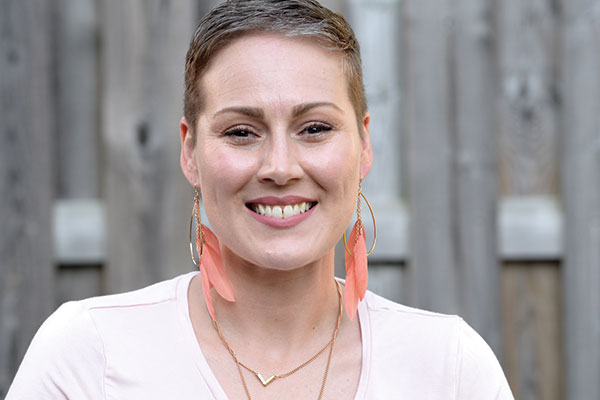Am I Lucky?
Dealing with Survivor’s Guilt After Cancer
by Michelle Burleigh
The 10-year survival rate for acute promyelocytic leukemia is 80 to 90 percent. This is what I was told when I was diagnosed with APL. Over the next four months of treatment, I often heard this refrain: “Of all the leukemias, this is the one you want to have!”
I’m sure the intention of these comments was to make me feel comforted. However, as a newly diagnosed leukemia survivor fighting for my life, that wasn’t always the effect. Besides, I couldn’t give my leukemia back or exchange it for another one anyway, so there wasn’t much value in the platitude. Nevertheless, the thought crept into my mind often over the weeks and months to come. Was I lucky? Should I be grateful for my type of cancer, my good prognosis?
It all came to a head one day when I was sitting in the outpatient services room during my second phase of treatment. A man with a different type of blood cancer sat down next to me and began telling me his story. After six triumphant months of remission, his cancer had come back. As I listened to him talk about his cancer recurrence, tears streaming down his face, I felt guilty.
I thought about all the times I had been told how lucky I was to have APL. Now here I was sitting across from someone not so lucky, eating my soup, which tasted great, and drinking my tea, which refreshed my body, knowing that within the next few weeks, my “unlucky” friend likely wouldn’t be able to eat much of anything at all. He would have nausea, maybe even mucositis. He would lose his hair and experience who knows how many other side effects for who knows how long.
And, while I had experienced nausea and mucositis, I didn’t anymore. I could eat; my food tasted good to me. My hair had fallen out, but it would grow back soon. And the most important part is I’ll most likely never go through those things again. How lucky am I?
Today was a challenging day. My doctors increased my dose of my APL maintenance drugs this week. My stomach feels a bit unsettled. I’ve been having chest pains and strange headaches again, and I haven’t felt like exercising. But I was able to get out and walk around the mall for an hour today, and that’s better than nothing. Better than many others who also call themselves cancer survivors.
Am I lucky? Yes, I am. I’m alive. Does my “luck” discount my experience? No, it doesn’t. Do I feel sorry for myself sometimes? I do, and that’s OK. The fact is, I faced down a life-threatening disease. And though my prognosis was good, there were moments when I thought I might not make it.
Yet, there I was in the hospital that day being pumped with a targeted chemo to combat my disease, sitting next to a man who was facing a relapse, and I felt guilty that my cancer wasn’t as “bad” as his. But, at the end of the day, everyone’s personal experience is their own. No one is the same. Diseases are different, treatment protocols are different, baseline health is different, mind frames are different, and so are prognoses. Associating luck with any of it is unfair.
While we can’t change the words people say to us, no matter how well-intentioned they may be, we can change how we receive them. In a society that has become dispassionate, having compassion for others is a beautiful thing. But it shouldn’t come at a cost to ourselves. Let go of the guilt. And live your life the best you can.
Michelle Burleigh lives in Georgetown, Ontario, Canada, with her fiancé Marvin and two beautiful daughters. Since being diagnosed with APL, her life purpose is to simply live in the present. She shares her experiences through her blog, So You’ve Got Acute Blood Cancer … Join The Club! (soyouvegotcancer.ca).
This article was published in Coping® with Cancer magazine, November/December 2018.
Everyone has a unique story to share. Do you want to share your survivor story? We consider a cancer survivor to be anyone living with a history of cancer – from diagnosis through the remainder of life. Here are our submission guidelines.


